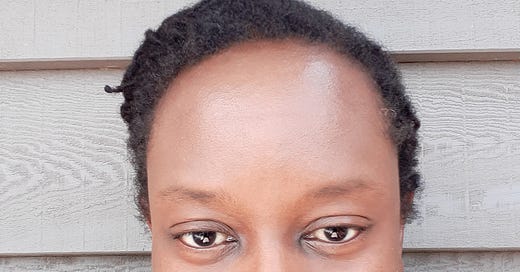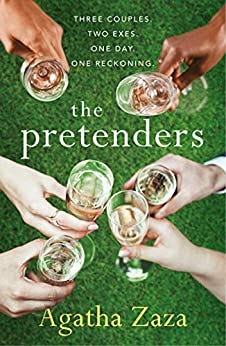Interview with Agatha Zaza - 2021
Interview #6 (fiction, literary fiction, short stories, suspense, crime fiction, novel)
Agatha Zaza lives in Auckland, New Zealand where she works in communications and non-profits. She also calls Helsinki and Lusaka home.
Agatha’s debut novel The Pretenders was born in Singapore, where she spent three years both as a trailing spouse and a freelance consultant. There she rekindled a long-dormant love of writing. Aside from Singapore, Agatha has worked and lived in several countries, among them the then-Soviet Union. While in Ireland, she earned a Master’s in Equality Studies from University College Dublin and followed that with a stint in international development in Uganda.
Agatha’s work can be seen in the Johannesburg Review of Books and in a PEN International special edition on African writers. She’s a dedicated slow runner, an occasional composter, and has been known to reupholster armchairs on occasion.
Randal Eldon Greene: Hello, Agatha Zaza.
In your debut novel The Pretenders, you've given us a story full of hidden layers. And each layer leads to more and fouler revelations. It's the type of book you read knowing a kind of terribleness is going to be revealed, but unless you're a good or lucky guesser, you won't know what form of devastation is in store. With a story that's so dependent on withheld revelations, I'm curious how exactly you talk about your book. What would you tell a prospective reader about The Pretenders?
Agatha Zaza: Hi Randal,
That's quite a tough question as I find it quite difficult to summarise The Pretenders. You're right, it has many layers and the joy of writing it was peeling through each layer of my characters and their situation and finding a new layer beneath it and wondering what would be at his or her core.
The book is not a thriller, though it could be seen as thrilling; neither is it the story of a single day because it's also the story of the many years before it. I suppose The Pretenders is really about your own family, friends and neighbours. Nothing that occurs in the book is inconceivable outside an ordinary upper middle income neighbourhood. None of the couples or the brothers at the heart of the story are vampires or drug dealers; in fact, individually their circumstances are rather mundane. None of my characters set out to be anything other than an ordinary partner, brother, father or lover - except perhaps John.
While I may insist that the book is not about a single day - however - the book describes that one day in the lives of six people when six lifetimes collide. It is about when all their histories and insecurities, their fears and their unfulfilled desires clash. It's about an inevitable day, how long were they supposed to continue as they were - pretending?
At the centre of the story is the relationship between two brothers. But is that really the centre? My early draft was about Jasper and his perspective, but it subsequently evolved into Edmund's story because he was the only person who could have changed the trajectory that the characters were on; right up to that day he could have changed everything.
If I am to summarise the book, I'd say the title does it incredibly well. When Sam [Brace] at Agora Books suggested The Pretenders, the first thing I thought was there must be a million books with that title. Surprisingly they were very few and most had to do with the band. Everyone is pretending that everything is ok, or will be ok.
Randal Eldon Greene: I think your zigzagging between the thoughts of the six characters and in and out of the past actually adds to the present moment in a very well-crafted, cumulative manner. We all live three lives really, wouldn't you agree? The past life that's continually dredged up into consciousness, the future life through our dreams and desires, and the present life which is a series of moments jarring us out of our recollections and our reveries. Your book portrays these three simultaneous lives without betraying a sense of mystery or tension.
Agatha Zaza: I'd agree that we all live three lives. Regarding their three lives, the future, or rather their dreams and desires for the future, is as essential to understanding how my characters behave as the past. For instance, to Jasper, one of the brothers, his fiancé Holly embodies what his future could be. To the other characters it may be decisions they have to make to ensure the future that they want even if that desired future is nebulous - undefined.
The cumulative effect that you mention again goes back to peeling away the various layers of the characters and their situation. As I wrote, I continually asked myself what went before the present or how did this person get to be where he or she is now?
Randal Eldon Greene: When you write, do you tend to approach characters or plot first?
Agatha Zaza:The Pretenders is unequivocally character led. The brothers and Holly came first. I think Holly was a mad scientist bent on taking over the world; I had to tone her down while retaining her significance. Ovidia was a more marginal figure in my earliest draft, then I changed her clothes and she came to life.
The plot came together quite early, the story was clear in my head - the difficulty was conveying what I could see in my head (and heart) in words. There were also many ways I could have told the story and setting it in a single day helped stop it from becoming too sprawled out. This came about when I saw the house online and this really helped me flesh out their universe. Someone out there in London lives in that house - I hope he doesn't recognise it and cry foul. Once I had the setting, the story came together and my first draft was ready in a few months.
I had, and still may have, a picture of the children's playhouse described in the first chapter. It was from a House & Garden magazine.
When I look at my short stories, one in particular "Waking a Sleeping Sun" was a story told to me in entirety - the essence of the plot is almost as it was described to me. However, the characters are of my own creation which made the story almost unrecognisable and enabled me to add the backstory and the additional characters.
"The Grass Beneath Us" published in the Johannesburg Review of Books was character led. It began as several pages of dialogue between two women who were so real to me that I felt I knew them. I had to extract a plot from their dialogue in order to create the short story.
Randal Eldon Greene: When did you first begin writing short stories, and did you find the transition from short-form fiction to full novel difficult?
Agatha Zaza: I've been writing short stories on and off since, perhaps, I was 18 or so. I've done absolutely nothing with most of my output, but I recall writing for a site called The Asylum in about 2001. I can't find any evidence of its existence, but I'm sure that's for the best. I was selected for a mentoring project by the British Council in about 2003 and one of my stories was published on their site, and while in Ireland a couple of my short stories were published in local magazines. Again, I didn't think to hold on to them, or perhaps I did but I've moved so many times since that I wouldn't know where to begin looking for them.
I don't consider taking up writing a novel as a transition; the two crafts are very distinct to me. I'm still writing short fiction. Writing a novel is difficult - fun, exciting, rewarding - but difficult. Short stories are much easier to complete and rework - it's also a lot easier to hold on to the essence of your story and your motivation.
However, completing a novel, getting those last words down, finishing my fifth rewrite, was an immensely emotional experience. As a reader, I don't think I was ever aware of how long and how much effort goes into writing a novel, and I appreciate novelists far more now.
Randal Eldon Greene: One of my fascinations is lost media. I was able to do a bit of digging and found your abandoned insane asylum. Apparently The Asylum is hosted on the website insaneonline.com, though it's been abandoned since 2007. Your story "The Greatest Writer that Ever Lived!" was published on June 12th, 2001 under what appears to be a literary magazine within The Asylum. Here's what they write about the publication:
Insane Entertainment opened its first online literary magazine, Virge Publishing, which later became Shell Beach Press before it was finally rolled into the brand new Asylum as the Storyteller, where it still resides today.

Unfortunately (or fortunately for you) the section archiving the pieces published under Storyteller is not functioning. Do you happen to remember the story?
Agatha Zaza: Wow, seeing this page after a couple of decades was quite a surprise. I have absolutely no memory what the story was about. It would have been short, less than a thousand words, but that was a lifetime ago.
Randal Eldon Greene: Are you planning to release a short story collection anytime soon?
Agatha Zaza: I don't have any plans to put together a story collection. I'm more interested in the recently new option of publishing single stories.
I like stand alone stories, for instance in Granta, The New Yorker, and Johannesburg Review of Books. They can deliver such an impact, a punch so to speak. However, when faced with a short story collection, unless that writer is a true master, it can often be a disappointing experience. Before I was sure that I'd write my novel, I tried my hand at a short story collection and found it's perhaps even harder to come up with a sufficient number of distinct ideas to fill a collection. So I prefer to occasionally drip them out over the years, rather than to target them towards a particular goal.
Randal Eldon Greene: If I remember correctly, you moved to a new home - a new country - right before the pandemic. I'd like to ask you if things are getting back to normal, but I can't assume you truly know what normal is for your new environment. So I'll ask instead, how has writing worked during a time of quarantine and social distancing, and how do you imagine your writing routine will look going forward?
Agatha Zaza: In short, I'd say it hasn't worked. I've found it quite difficult to adapt my writing to my new life, not just because of the pandemic but because many things about my life changed when I moved to Auckland.
Before Auckland, I'd been self-employed for years and most of that involved working virtually. I worked part time and knew that I had a few free working hours each day. Now writing is something that's squeezed in between my work and family life. I still write but I have put it in its place - I'm not dedicated to it, but it's an important part of my life.
That said, I've recently started making progress in a novel and the excitement is encouraging me to keep at it. One thing I've grown to understand this time is that it can take quite a long time to write a manuscript especially when you don't have hours a day to dedicate to it. It's easy to lose focus or get bored.
In short, I don't have a routine, I just write.
Randal Eldon Greene: I've heard of authors writing their novels in the minutes before office meetings. That's something I certainly cannot do! Like you, I need to put writing in its own place and time. I'm glad you're making progress on a new work. I'd love to see a second Agatha Zaza novel. Are you comfortable sharing anything about this work-in-progress?
Agatha Zaza: Well, my work-in-progress is primarily a crime novel with a lot of relationships thrown in. I've lots of descriptions of people and places but the crime itself seems elusive. I don't mind because I'm doing a lot of character studies.
Writing before a meeting - it depends on the job. Writing is one of several competing priorities; my writing goals can be postponed, my family and work life can't. Before a meeting I'm focused on my upcoming meeting; I'd rather excel at my task at hand than scribble in some mediocre text and perform poorly at my work.
Randal Eldon Greene: I agree that writing before meetings seems like a desperate kind of novel writing, but if that's all the actual free time you had, then I'd commend the effort nonetheless.
An elusive crime sounds intriguing indeed, and I'm much more drawn to a book focused on characters and relationships than a plot to unravel a mystery. What crime or mystery writers have influenced or inspired you?
Agatha Zaza: When it comes to crime, Leila Slimani's The Nanny (The Perfect Nanny in the US), influenced my decision to write a book focused on crime. She describes it as a Whydunnit, rather than a Whodunnit, and this is what I'm interested in. I'd like to explore the life of the offender, their motivation and drive.
Of course John le Carré was a master of literary espionage; he showed that a thriller can be literary. I don't think I could write in the conventions of mystery or thriller genres. I'm a fan of the slow burner, the character analysis.
Randal Eldon Greene: I like the idea of a Whydunnit. This leads to my next question. Why do you write? What do you get out of it?
Agatha Zaza: I'm not sure. I suppose it's similar to how some people enjoy watching trains or birds - something about it makes it fascinating. Most of what I write doesn't make it to completion, but regardless it's always worth the effort.
When I do complete something, mostly I file it away and never do anything about it. One of the pleasures of having published The Pretenders is having proof that I worked on it to its real end, that someone else read it and that it was good.
Having a readership and receiving feedback may be affirming but it's not why I write, and I don't think it makes any real difference to my love of writing.
Randal Eldon Greene: I know you're a part of the Literary Fiction Writers group on Facebook - which I run - because you're one of my moderators. How have the writing communities on social media influenced your writing or your writing identity?
Agatha Zaza: After trying several Facebook writers' groups, finding the Literary Fiction Writers was a relief. I found many of the groups were too prescriptive in their advice. Many were dead set on specific formats and techniques and were filled with jargon and buzzwords such as WIP, twists and MCs. The Lit Fic Writers support individuality and creativity. If I'd stayed with the other groups my book would probably be labelled BWWM HFN or something similar.
That said, Facebook exposed me to many writers and genres I'd never come across before, I learned what I did not like, I learned about the difference that the quality and presentation of your work make, and received advice about the querying process and the variety of small and medium-sized presses across the world. However, a piece of advice I'd give anyone involved with books and social media is to look at a writer's portfolio before taking their advice. There are so many people on social media who'll offer advice on how to write a bestseller or how to self edit, and yet there's no evidence of them having written a bestseller or their books are badly edited.
In short, no. Social Media hasn't really influenced my writing. Most of my favourite writers do not have significant social media presence, for instance Zadie Smith, Leïla Slimani. and Chimamanda Ngozi Adichie. I listen to them speak on the radio and read about them in the mainstream press. I'm a big fan of The New Yorker's fiction section and of Open Book and the World Book Club on the BBC. I find that when writers talk about their work in this way - without the pressures and politics of social media - I learn so much more than I would on Facebook on Instagram.
Randal Eldon Greene: Do you have any final words of advice for those struggling to write their novel?
Agatha Zaza: My final words of advice would be:
Finish your novel or don't. It may seem flippant but it's not the end of the world if you do not write that novel.
If you're really struggling then assess your reasons for writing it in the first place. If you want to satisfy an inner desire to write try non-fiction or short stories, write a fiction blog perhaps. Maybe writing a novel seems an incredibly cool thing to do, in which case look for another source of cool.
If you really want to finish your manuscript, I suggest following a simple genre format, the romance or thriller. Once it's done you can always return to it and add nuance or originality - but at least it's done.
Purchase The Pretenders on Amazon
© 2021
About the interviewer:
Randal Eldon Greene is the author of Descriptions of Heaven, a novella about a linguist, a lake monster, and the looming shadow of death. His typos are tweeted @AuthorGreene and his website is AuthorGreene.com





